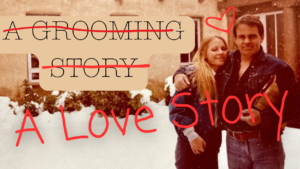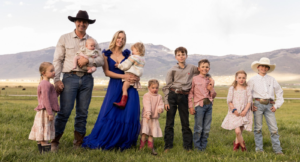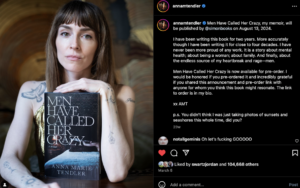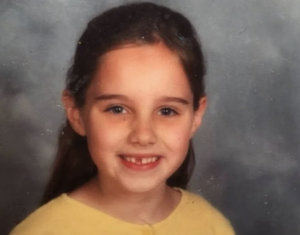
In 2001, when I was seven, I asked my first-grade teacher (a sugar-sweet, angel-on-earth woman named Sister Mary William) why 9/11 happened. She told me, “Because some people don’t have the love of Jesus in their hearts.”
“It made a lot of sense to you,” my mom recalled later. Then she added, “At the time.”
My First God: God
My dad used to say: “I have no problem with people who speak to God. Hell, I don’t even have a problem with people who say God speaks back! My problem only starts when people speak for God.”
My parents are both believers, Catholics, with a genuine emotional connection to God, but they have their hang-ups about the Catholic church. I didn’t feel actively pressured by them to be religious, but they did express that they see religion as a tool, a sort of emotional safety net, that you can fall back on when times get tough, as times tend to do.
So, despite the reservations that I heard them express over time, I can definitively say that I was raised Catholic. I went to Catholic school from kindergarten through 8th grade. We went to mass every Sunday, and every morning during Lent. I prayed every night and before every meal. I was baptized and confirmed and I celebrated my first communion in white gloves and a white veil and a puffy white dress. Almost everyone I knew was Catholic– Irish Catholic, at that. On the street where I grew up, there were three families with more than ten children. I’m one of four kids, my mom is one of five, and my dad is one of seven. Where I grew up, eight-year-old girls picked up their two-year-old siblings and carried them up the street to the park with all the expertise of a long-time mom. I had a vastly inflated idea of how many people in the world have red hair.
Growing up like that, surrounded by gingers, it changes the way that your brain works.
The way that my brain developed was (sometimes, I believe, irrevocably) influenced by religious thinking. Now, I want to clarify that religious thinking can mean something different for everyone. But here is what that meant for me:
- The feeling of being observed constantly: I, still, always feel like there is a third party watching and passing judgment on my actions, even when I’m alone. When I was a child, this was often God, but as I got older, I started to imagine other people or fictional characters watching me, thus changing the significance of every action by viewing it under their own framework.
- Thought-policing: I imagine that this third party can hear and understand even my thoughts. As a kid, sometimes the thought would randomly pop into my head: I hate you, God! And I would immediately be overcome with guilt and offer prayers of apology.
- Black-and-white thinking: Religion also gave me a binary way of thinking about morality (and, now that I think of it, a binary way of thinking about most things). This has led to a stubbornness about what is right and what is wrong, and it adds a gravity and justification to anything I deem as “wrong.”
- Community: All of these ways of thinking are empowered by the fact that I do not feel alone in looking at the world in this way. The idea of “community” could sound like a net-positive, but doesn’t the existence of an in-group imply the existence of an out-group? Community is inherently exclusionary if it is contingent upon your religious beliefs.
- Guilt: With constant thought-policing and a clear-cut idea of morality, the reasoning behind Catholic Guilt becomes increasingly obvious. I still very often feel that I am doing something wrong, even when I am just existing. Guilty for the way I sit. Guilty for the way I sleep. Guilty for my thoughts. Guilty for lifting my head and looking around at the world.
- Love: I remember my dad brushing my hair once, and telling me what the phrase, “you shouldn’t judge a book by its cover” means. He said that anyone can be a good person, no matter what they look like. I started asking him questions: What if they have a big, green mohawk?! What if they have piercings all over their face? And a tattoo on their neck, and a tongue like a lizard? Every time, he told me, yes, they can still be a good person. I remember considering an image in my head: a neon-green-mohawked punk, face pierced with heavy hardware, smiling and playing with a little kitten.
In a relatively recent interview with the New York Times Book Review, Zadie Smith talked about her admiration for Toni Morrison, and Morrison’s ability to write even the most vile characters with humanity and grace. Zadie Smith pointed out that people often forget that Morrison was a devout Catholic, and Smith believes that her Catholicism is what allowed her to write all types of characters with love and forgiveness.
I do believe that Catholicism, at its best, is this. To be born human is to be born with original sin, but in the image of God. Blessed are the poor. Blessed are those who hunger. Blessed are those who mourn.
My Second God: Feminism
When I was eight, my fourth-grade teacher separated the boys and girls and she sat down with the girls. She said, “Now, you’ve all heard the word sex before.” A girl in my class loudly gasped and covered her mouth.
My teacher read us a passage from our textbook that explained that sex is only something that can happen within the confines of marriage. We talked about how us girls, because we were women, bore the responsibility of controlling sex and ensuring that it never happened outside of marriage. The general philosophy that I learned growing up is that abortion is wrong, and birth control is wrong, and having a baby outside of wedlock is wrong, so the only solution is to wait to have sex until you are ready to be a parent. I was informed that men have stronger sexual desire than women, and I understood that if I became pregnant before someone “made an honest woman out of me,” then the social stigma would mostly fall on me.
For high school, I left Catholic school and went to a boarding school about 45 minutes away from my house (I commuted each day, but there were students living there from all over the world). My high school was very focused on the arts and music. I met people, both teachers, and classmates, who, I felt, were lightyears smarter than me, and every day, someone said or did something that made me feel like my mind was physically expanding, stretching– I heard philosophies that I had never even considered before, and ideas that broke the framework of religious thinking that I grew up with (or so I thought).
My first year in high school, I argued the pro-life side in debates. I asked people what they were giving up for Lent as a topic of conversation, only for them to look at each other and laugh. I was teased for being religious (I should mention– it was very vanilla compared to the bullying that went down in Catholic school). In a lot of expensive academic environments like that, religion, and especially Catholicism, is seen as back-country, old-school, and intellectually weak. I’m reminded of the Maria Semple novel, Today Will Be Different, when she spends much of the book wondering where her husband disappears off to and worries that he is having an affair, only to find out toward the end of the book that (spoiler) he joined a church. In the ensuing argument, she hisses at him, “Please stop saying ‘Jesus.’ People might think we’re poor.”
Then I started becoming interested in boys. My freshman year I had a crush that consumed my thoughts. It distracted me in class. It made me catch my breath. And because my faith was so closely intertwined with sexuality, because denying sex as a woman was presented to me as such an integral part of Catholicism, I saw the two things as inextricably linked. I could not rectify the idea of myself as a Catholic woman and a sexual being; I saw the two things as mutually exclusive. Thus, getting older and having crushes, for me, became a crisis of faith, guilt, and identity.
Around this time, my English class was reading House of Mirth by Edith Wharton. My English teacher said that in all of her classes, often, the boy students had more difficulty relating to the female protagonist. And yet, the girl students found it easy to relate to both male and female protagonists. She wondered out loud if that could be because women were used to relating to male protagonists because white men were seen as the “default,” while anything with a female protagonist was automatically seen as a story for women. Then she shrugged as if she hadn’t just blown my mind.
After class I was processing what I had just learned, and talking a mile a minute to a friend. He was not as interested in the conversation. “You know what she is, right?” He said to me. I shook my head, then he whispered, as if he were informing me that she was a lizard person: “She’s a feminist.”
“Oh, is that what that is?” I said. “‘Cuz, uh, she’s been making a lot of sense to me.” Subtext: Am I a lizard person, too?
As I graduated high school and went to college, I adopted the same mocking tone of my peers when I spoke about religion. My senior year, approximately 70% of my friends came out of the closet (I was a theater kid) and many of us felt judged or even traumatized by the Christian morality that we grew up with. When I was going away to college, my mom, with the kindest intentions, encouraged me to make friends at church, and I rolled my eyes, because I was 17, so, of course, I knew everything and was smarter than everyone.
While I had grown up Catholic, I should mention that I also grew up in an Irish Democrat area of Scranton, the same area that Joe Biden comes from, where you learn that John F. Kennedy’s greatness is only paralleled by George Washington’s and Abraham Lincoln’s. I believe that despite being religious, my family’s political leanings allowed for enough of an open mind that I was primed for the political dogma of the American Left to align with my opinions.
When the 2016 election came around, I was a double major in English and Theater at Penn State. I had been further radicalized by helping friends who were victimized by sexual assault and a close encounter with a serial rapist while studying abroad. My friends and I smoked weed in apartments decorated with Bernie paraphernalia. I wrote politically charged plays about rape culture and memorized the words to Hamilton songs. I had grown up in the Obama era, feeling optimistic about American politics and sure that the U.S. had good guys, and bad guys, and the good guys always won. When we heard Trump say, “grab ‘em by the [cat,]” we were sure that he would never have a political career. The day after he won, the students in my classes were quiet and shocked, as if we had grown up with parents who we thought were the ideal couple only for them to suddenly divorce; overnight, we realized that we grew up in a place that was much more conflict-ridden and divided than we had previously thought.
During this time period, my frame of thinking, even though I would scoff if you told me so at the time, was very religious.
While I thought I had outgrown my religious beliefs, I had, in reality, replaced them. As Nietzsche predicted before the 20th century proved him right, a shift away from traditional religious values creates a vacuum, which can then lead to power struggles and conflicts as new value systems emerge. Sometimes, those new value systems are politics. Something in my nervous system told me to experience my life through the lens of a belief set that involved elements of guilt, community, and dichotomous morality, and my political beliefs rose to the occasion.
- Community: I found people who agreed with me both online and in person. These online bubbles openly encourage one to argue your political beliefs even when no one agrees with you. Popular statuses proclaimed: “If you don’t argue with your family at Thanksgiving, you’re not a true ally.” For me, this did not necessarily lead to feelings of being observed constantly, but it did contribute to this feeling that your opinions should dictate your actions regardless of whether or not the people around you support them.
- Thought-policing: I monitored myself for internalized misogyny. I asked myself if I listened to women as much as I listened to men. If I stepped to the side on the street for a man to walk by, I questioned myself: Did I do that just so he could get by? Or did I do that because I think he has more of a right to this space than I do?
- Black-and-white thinking: During this time when the U.S. was so divided, I, too, was judgemental and callous toward anyone who disagreed with me politically. I didn’t see any moral wiggle room with my beliefs. The Democrats were the right ones. The good guys. I believed that those who didn’t vote like me were morally corrupt. I counted myself among the 27% of Democrats at the time who saw Republicans as a “threat to the nation’s wellbeing.” I defended women’s reason when they tweeted, “Men are trash,” and I believed the stereotype that men were uniquely prone to violence or other evil acts.
- Love: In 2017, a group of friends and I drove to DC with homemade posters. I wore a crew neck that said, “A Woman’s Place is in the House and Senate.” We participated in The Women’s March, which, at the time, was the largest single-day protest in the history of the U.S. We sang songs and marched with women who were born in a world where they weren’t legally allowed to divorce an abusive husband. I stood up for myself in ways I hadn’t before. I stood up for my friends. They stood up for me. And in standing up for each other, we also celebrated each other, and celebrated the experience of being flawed, complex, fallible, human women.
The Transvaluation of Values
I believe that if I had stayed in the U.S., I would have completed the next phase of my transition into worshipping the accumulation of capital, with religious gatherings every day from nine to five, where I likely would have stayed until well into my old age. But I had a major life event that disrupted this transition.
I left the United States in 2018. I moved to the Galapagos Islands, where I had no Internet connection in my apartment and enough biodiversity and sunshine to make me lose all interest in what the Internet had to say anyway. I had a balcony that was eye-level with a papaya tree where sometimes a white barn owl would perch and look at me with big, black eyes. I shared this balcony with a handsome, gay, alcoholic philosopher whom I (naturally) fell in love with. When we weren’t sitting on the balcony rethinking, reflecting, and recounting, I was privately reading or writing.
The American Transcendentalists wrote that we can find God in nature, and I do believe I’ve come closer to touching the divine while experiencing the wonder of God’s creations than I ever did in church. After one year in the Galapagos, I seriously considered succumbing to the pull of the islands and staying for another year, maybe two years, maybe a lifetime. I made $750 a month. I spent my lunch breaks at the beach. I had a six-year-old student who gifted me a big, drooping, hot pink flower every day that I would put behind my ear before picking her up and holding her while I taught my class. What more could I want?
While I’m sure this sounds idyllic, and it was, this also marked the beginning of a period of intense loneliness. When you leave your home country, you leave behind your social circle, your family, and all of the in-groups that you built around yourself. I struggled with heavy homesickness and guilt, sometimes even wondering if I could ever feasibly overcome it.
Still, I could have easily floated through the rest of my days in a Dionysian blur, always drinking a little bit too much and smoking a little bit too much then sweating it out in the sun the next day and meeting and saying goodbye to a series of “soul mates” and never finishing the novel that I was writing. I once met an American woman in the Galapagos who had fallen in love with a man from the islands and stayed, having three little kids. She was so isolated from the mainland, so disconnected from her original life, that her accent had changed. She no longer had an American accent, and in its place was a sort of trans-Atlantic, neutral English. She looked about 20 years younger than her actual age. She wore a heavy, hot pink flower behind her ear. I understood and respected her choices, but I realized that it was not the life I wanted. I needed a challenge if I was ever going to grow. I wanted to be connected to the world, even if the world was painful sometimes.
Still not ready to move back to the U.S., but ready for a big city, I set my sights on Buenos Aires, where a friend had told me there were more bookstores per capita than any other city in the world. Within a month, I met an opinionated and diligent man named Federico. He showed me around the city on a motorcycle that he had designed and built. I realized that I might not be going home as soon as I thought.
Fede is a deep thinker. He spent his college years watching philosophical debates at the University of Buenos Aires. He had lived with two Chilean socialists in his late teens who were so adamant in their refusal to participate in The System that they didn’t have cell phones and, in the absence of a backyard, composted all their trash in a bucket under their bed (this predictably, smelled horrible and Fede sought out new roommates as soon as his contract allowed). Fede introduced me to Latin American socialist thought through the work of Eduardo Galeano. I told him about Transcendentalism. He told me about Stocisim.
Fede was raised Catholic, as I was, but by the time I met him, he had a strong, persistent aversion to what he always referred to as “institutions.” “Institutions” could be a church, a business, a football team, or a university. He observed and criticized North Americans’ tendency to define themselves by the brands they use. I agreed with him to an extent, but I argued that sometimes these institutions are necessary for, well, getting anything done. He once told me about bringing food to women who were marching for the right to abortion in Argentina so that they could stay put in front of the Casa Rosada (the Argentine white house). I asked him if he was a feminist. He said that he doesn’t identify with any “-ist.” I pointed out that, while moral independence can be philosophically healthy, it can be practically unproductive. The pro-choice marches in Argentina wouldn’t have been quite as compelling if only one person showed up.
Regardless, I did begin to recognize and dismantle the ways in which my institutions told me how to think and how to behave. For the first time, I examined all institutions and belief sets, not just explicitly religious ones, and I recognized how they could quickly become exclusive and even inhuman. The institutions that I chose were not somehow above corruption simply because I had chosen them.
In college, I participated in a production of Julius Caesar and I played the antagonist. (The antagonist of Julius Caesar is “the mob,” so, in other words, I auditioned and didn’t get a real role, but I got to participate as one of the screaming masses.) The opinion of the mob is not based on logic. The mob loves Caesar. Then, they hate Caesar! They gleefully cheer on his death. Then they cry about how much they miss him. Literature shows us this lesson over and over again. We read The Lottery in school, a story written in 1948 that tells of a community that chooses one person to be stoned to death each June. Humans go along with the mob. Their morality is defined by the mob. And yet, the mob is often illogical. Easily corrupted. This is why I don’t like art that depicts Germans as uniquely prone to Nazism, because they “love to follow the rules” and culturally “do as they’re told”– because it allows us to wash our hands of any ickiness that comes with the realization that sane humans are capable of inflicting great pain. We say: “Sure, the nazis did awful things. But my group wouldn’t do that.” I have an aversion to any philosophy that depicts a certain group of people as uniquely predisposed to evil acts. (“They didn’t have the love of Jesus in their hearts.” “Men are trash.”) I have that aversion because thinking that evil belongs to just one group, one religion, one nation, one gender, etc., blinds you to the evil that you yourself are capable of. It blinds you to the reality that you, too, worship institutions. That if your social circle were doing a lottery, you would also throw a stone.
Nietzsche called this the Transvaluation of Values. It’s the breakdown of a value system that was built around your personal morals or the morals of a society. While the ultimate end-point of transvaluation is a sort of enlightenment, becoming your own “God” or übermensch, the process of changing your value set is also marked with conflict and suffering. In my case, that was true. It was painful to lose my community. It hurts to not know what to believe; to think you had the answers then realize that those “answers” are only correct within a very specific, miniscule circle of people. I’ve spent most of my adult life living outside of my home country, and I’ve spent a lot of time feeling cast away, small, and afraid when pitted against the vastness of the universe.
Homecoming
Lately, I’ve been going to mass again. I know that seems like a non-sequitur. Bear with me.
Fede and I got married last December. And although we met (and now live) in Argentina, neither of us is from here. Fede permanently left his home country when he was just 18, and much of the philosophical and spiritual searching that I mentioned earlier on his part was his own transvaluation. While we both came from Catholic backgrounds, we both came to very different conclusions about how to grapple with our faith in our adult years.
This was my thought process: First, I realized something about myself. Whether or not I tell it to, my brain looks for the church. It looks for moral answers. It looks for a spiritual practice. I genuinely think that religion was integral to the way my brain developed, and if I’m not “religious,” per se, then I will find another belief set to adhere to as if it were a religion, even if I do so unconsciously.
Recognizing that, I have a few options, as I see it.
- I could flat-out reject institutional and religious thought, declare myself the überfrau and worship only my own force of will. Fede’s choice somewhat aligns with this; he took steps to remove feelings of guilt and “the fear of God,” as he puts it, and consciously does not identify with any -ist or -ism.
- I could lean into it. I could “find my way back to Christ” and again allow religion to dictate my thoughts and actions.
- I could formulate my own belief set (like in the first option), then attach it to some form of mysticism to lend it a religious credence. I will explain this in depth later on.
The first option of rejecting religion was very attractive to me, but I saw some issues with it.
- It felt a bit depressing. I find elements of spirituality very comforting, especially the bits about dead loved ones still being around and intensely peaceful meditative experiences being somehow “divine.”
- It lacks a community. If you are agnostic, you must seek out community in other ways.
- While there were times when I thought of philosophical thought as a way of “figuring out” reality around me (this kind of debate approach: “Who’s ‘right?’ Atheists or Christians?”), I’ve come to realize that I’m never going to “figure it out.” Much smarter people have tried. These ideas of some sort of divine will, fate, the afterlife, One Great Unifying Love Between All Things– I will live and die without knowing for sure if these things really exist or are just little dancing lights on the peripherals of human consciousness. Hallucinations. And, honestly, who gives a shit? I have one, short, irrelevant life. Maybe I shouldn’t spend it trying to be “right” all the time. Maybe it makes me feel better to think that my grandma visits me as an owl. Maybe I should let myself have that.
So it sounds like I want to be religious. But, to be perfectly honest, the second option, a sort of all-or-nothing Catholicism approach, was the least appealing to me. I had seen religion and institutions in general be capable of too much evil; of parents letting their kids die because their religion didn’t allow for the use of antibiotics or spiritual leaders using the idea of the divine as a front and justification for sexual abuse. I couldn’t wholeheartedly participate in that. I still had too many questions.
Lately, I’ve been going with option three.
In Catholicism, for the forty days before Easter, a lot of people make certain sacrifices, like not eating meat on Fridays. You’re also supposed to choose one thing that you want to give up, like ice cream or coffee or yelling at your wife.
This year, when Lent rolled around, I had been trying to spend less time on my phone. I put an hour-limit on social media that worked for about two days, then I would just override the app-block and start scrolling again. Then, I went to mass on Ash Wednesday with my mother-in-law (this is the first day of Lent). I prayed. I set an intention. I promised myself in my head that I wouldn’t go over one hour of screen time, then the priest used his elderly, shaking hand to draw a little cross on my head with ashes. The next day, when my phone alerted me that I had been online for more than an hour, I was suddenly like an eight-year-old kid again. I gasped and closed my phone immediately. Then I laughed at myself. It was almost ridiculous, but it worked. And it worked extremely well. The fear of God was alive and well in my heart. I had tried to run from it, but maybe I could harness it.
Why I go to Church on Sundays
I love going to mass. Every Sunday, I think that I’m looking at the tiniest, oldest lady on earth, and then the next Sunday, I see a new lady who is even tinier and older. As Saoirse Ronan discovered at the end of Lady Bird, when you’re homesick or otherwise emotionally struggling, going to church can offer a comforting ritual that makes you feel connected to the people around you and your childhood self.
At a certain point, I realized that discipline (that is, the delaying of an immediate desire in service of a longer goal) has served me in many aspects of my life. Financial discipline (saving up), intellectual discipline (switching out the endless scroll for some writing time), physical discipline (making time for a daily workout), etc., all of these daily practices greatly increase my confidence and quality of life. And yet, I could incorporate those habits into a day and still be left with more spiritually-minded questions and philosophical angst that nihilism only seems to worsen.
Sometimes, it’s very difficult for me to grapple with the basic realities of life, like how we can continue to go through every day with the knowledge that we are creeping toward death. The elderly people in my life manage these heavy truths through their spiritual belief set. They don’t think, “I’ll be in the ground soon,” they think, “I’ll be in heaven soon. I’ll get to see my first husband again soon. And my second husband again soon. Maybe they’ll fight over me and I can be like, ‘Oh my God, boys, stop.’”
An hour of meditation, even if I don’t believe everything that they talk about in mass, is a good time to mull over those questions of life and reestablish what is important to me. And once I decide what I believe, praying on it and putting it in a religious context seems to deepen those beliefs in my mind and lend credibility to them, even if they didn’t initially come from the church’s teachings. For example, I still consider myself a feminist. My belief set doesn’t see sex as an inherently moral or immoral act. I select my beliefs from different dogmas as if I’m choosing my favorite fruits from different baskets at the market, intentionally and carefully selecting the most delectable philosophies, regardless of which dogma they come from. This means that my opinions are often unpredictable, so if you want to know how I feel about something, don’t assume. Ask me. I love to talk about it!
I have many beliefs that were shaped by my experiences interacting with the world. I’m that kid who grew up Catholic, but I’m also the young woman who attended protests and marches and sought out (and found) divinity on the islands where the theory of evolution was formed. I’ve listened to birdsong and music and released my guilt into the air through the realization that I, like nature, am simultaneously a perfect manifestation of the divine with nothing to prove, and a constantly growing, adapting, flawed, living being.
And what would I be doing at noon on a Sunday anyway? Staring at my phone? It’s nice to go sit in a pretty room with a bunch of old people. They bring their grandkids and hold hands with them during the whole hour. They get excited when their friends show up. We all shake hands and wish each other peace. When I wish them peace, I really mean it. I hope they’re at peace with life and the pain that comes with life, and the relief that comes with death. I hope to find that peace, too, or at least to come to peace with the fact that I will spend my life searching.





